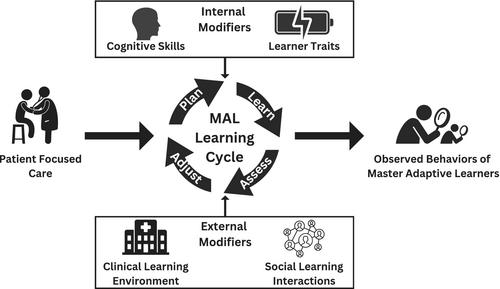The Master Adaptive Learner (MAL) model postulates that learners develop adaptive expertise through cycles of self-regulated learning. Despite a robust theoretical basis, the actual observable behaviors of MALs are not well characterized. We sought to define behaviors that characterize MALs within emergency medicine (EM) training.
Using a constructivist grounded theory approach, we analyzed semistructured interviews with expert EM educators. These experts reflected on observable behaviors as well as factors in the clinical learning environment that may modulate these behaviors. We recruited using purposive sampling until thematic saturation.
We identified four overall themes, of which three described groups of learner behaviors and a fourth described modifiers of these behaviors. Learner behaviors include: (1) critical interrogation of practice, (2) intellectual risk-taking, and (3) intentional curation of a learning network. Critical interrogation of practice encompasses several observable behaviors including learner-driven feedback conversations, independent synthesis of clinical information, appropriate deviation from algorithms based on their conceptual understanding of core principles, intentional use of case variation and hypothetical questioning, and continuous refinement of decisions. MALs also engage in intellectual risk-taking for their development by communicating clinical decision-making processes even at the risk of being wrong, openly addressing errors and gaps, and intentionally seeking out uncomfortable experiences. Intentional curation of a learning network is the deliberate development of a consortium of trusted individuals who serve as mentors and sounding boards. We also identified a fourth theme related to the expression of learner behaviors: learning environment modulates behaviors. Active promotion of psychological safety is necessary for learners to express these behaviors. This safety is mediated through trusting relationships and expert supervisors who serve as colearners and role models.
We present several behaviors that allow identification of MALs among EM trainees. These data expand our understanding of MALs and the critical influence of the learning environment. Identification of these behaviors may allow for more precise categorization of targeted curricular interventions and meaningful learning outcomes.



